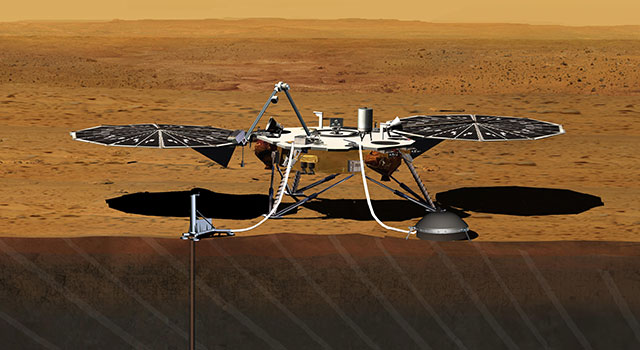NASA Administrator Charles Bolden and Jean-Yves Le Gall, president of the National Center of Space Studies of France (CNES), signed an implementing agreement Monday for cooperation on a future NASA Mars lander called the Interior Exploration Using Seismic Investigations, Geodesy, and Heat Transport (InSight) mission.
“This new agreement strengthens the partnership between NASA and CNES in planetary science research, and builds on more than 20 years of cooperation with CNES on Mars exploration,” said Bolden. “The research generated by this collaborative mission will give our agencies more information about the early formation of Mars, which will help us understand more about how Earth evolved.”
The InSight mission currently is planned for launch in March 2016 and is scheduled to land on Mars six months later. Designed to study the planet’s deep interior, the mission seeks to understand the evolutionary formation of rocky planets, including Earth. InSight also will investigate the dynamics of Martian tectonic activity and meteorite impacts using CNES’s Seismic Experiment for Interior Structure instrument (SEIS).
SEIS will measure seismic waves travelling through the interior of Mars to determine its interior structure and composition, which will provide clues about the processes that shaped the planet during its earliest stages of formation.
Other partners working with CNES on the SEIS instrument include: the German Aerospace Center, United Kingdom Space Agency, Swiss Space Office (through the European Space Agency) and NASA.
InSight’s international science team is made up of researchers from Austria, Belgium, Canada, France, Germany, Japan, Poland, Spain, Switzerland, the United Kingdom and the United States. NASA’s Jet Propulsion Laboratory, Pasadena, Calif., a division of the California Institute of Technology in Pasadena, manages InSight for NASA’s Science Mission Directorate, Washington.
For more information about SEIS, visit: http://smsc.cnes.fr/INSIGHT/ .
For more about InSight, visit http://insight.jpl.nasa.gov .
For more information about NASA and planetary exploration, visit: http://www.nasa.gov


